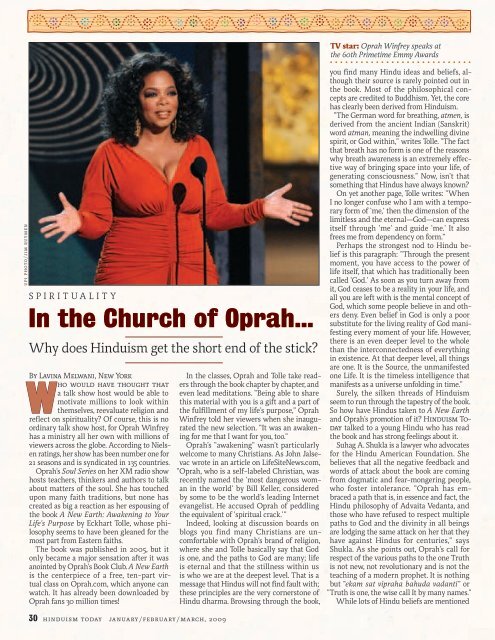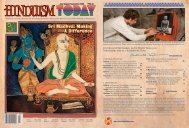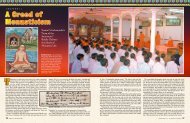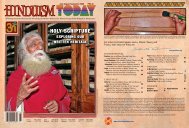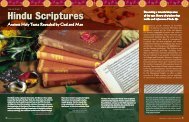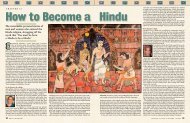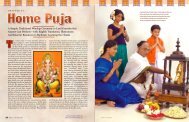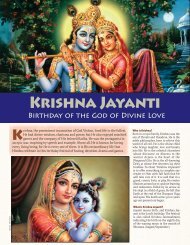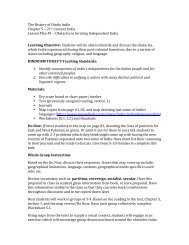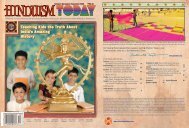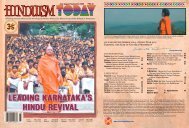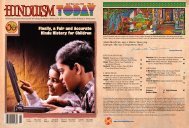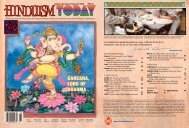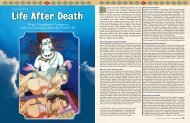Hinduism Today January 2009 - Cover, Index, Front Articles
Hinduism Today January 2009 - Cover, Index, Front Articles
Hinduism Today January 2009 - Cover, Index, Front Articles
Create successful ePaper yourself
Turn your PDF publications into a flip-book with our unique Google optimized e-Paper software.
upi photo/jim ruymenspiritualityIn the Church of Oprah…Why does <strong>Hinduism</strong> get the short end of the stick?By Lavina Melwani, New YorkWho would have thought thata talk show host would be able tomotivate millions to look withinthemselves, reevaluate religion andreflect on spirituality? Of course, this is noordinary talk show host, for Oprah Winfreyhas a ministry all her own with millions ofviewers across the globe. According to Nielsenratings, her show has been number one for21 seasons and is syndicated in 135 countries.Oprah’s Soul Series on her XM radio showhosts teachers, thinkers and authors to talkabout matters of the soul. She has touchedupon many faith traditions, but none hascreated as big a reaction as her espousing ofthe book A New Earth: Awakening to YourLife’s Purpose by Eckhart Tolle, whose philosophyseems to have been gleaned for themost part from Eastern faiths.The book was published in 2005, but itonly became a major sensation after it wasanointed by Oprah’s Book Club. A New Earthis the centerpiece of a free, ten-part virtualclass on Oprah.com, which anyone canwatch. It has already been downloaded byOprah fans 30 million times!In the classes, Oprah and Tolle take readersthrough the book chapter by chapter, andeven lead meditations. “Being able to sharethis material with you is a gift and a part ofthe fulfillment of my life’s purpose,” OprahWinfrey told her viewers when she inauguratedthe new selection. “It was an awakeningfor me that I want for you, too.”Oprah’s “awakening” wasn’t particularlywelcome to many Christians. As John Jalsevacwrote in an article on LifeSiteNews.com,“Oprah, who is a self-labeled Christian, wasrecently named the ‘most dangerous womanin the world’ by Bill Keller, consideredby some to be the world’s leading Internetevangelist. He accused Oprah of peddlingthe equivalent of ‘spiritual crack.’”Indeed, looking at discussion boards onblogs you find many Christians are uncomfortablewith Oprah’s brand of religion,where she and Tolle basically say that Godis one, and the paths to God are many; lifeis eternal and that the stillness within usis who we are at the deepest level. That is amessage that Hindus will not find fault with;these principles are the very cornerstone ofHindu dharma. Browsing through the book,TV star: Oprah Winfrey speaks atthe 60th Primetime Emmy Awardsyou find many Hindu ideas and beliefs, althoughtheir source is rarely pointed out inthe book. Most of the philosophical conceptsare credited to Buddhism. Yet, the corehas clearly been derived from <strong>Hinduism</strong>.“The German word for breathing, atmen, isderived from the ancient Indian (Sanskrit)word atman, meaning the indwelling divinespirit, or God within,” writes Tolle. “The factthat breath has no form is one of the reasonswhy breath awareness is an extremely effectiveway of bringing space into your life, ofgenerating consciousness.” Now, isn’t thatsomething that Hindus have always known?On yet another page, Tolle writes: “WhenI no longer confuse who I am with a temporaryform of ‘me,’ then the dimension of thelimitless and the eternal—God—can expressitself through ‘me’ and guide ‘me.’ It alsofrees me from dependency on form.”Perhaps the strongest nod to Hindu beliefis this paragraph: “Through the presentmoment, you have access to the power oflife itself, that which has traditionally beencalled ‘God.’ As soon as you turn away fromit, God ceases to be a reality in your life, andall you are left with is the mental concept ofGod, which some people believe in and othersdeny. Even belief in God is only a poorsubstitute for the living reality of God manifestingevery moment of your life. However,there is an even deeper level to the wholethan the interconnectedness of everythingin existence. At that deeper level, all thingsare one. It is the Source, the unmanifestedone Life. It is the timeless intelligence thatmanifests as a universe unfolding in time.”Surely, the silken threads of <strong>Hinduism</strong>seem to run through the tapestry of the book.So how have Hindus taken to A New Earthand Oprah’s promotion of it? <strong>Hinduism</strong> <strong>Today</strong>talked to a young Hindu who has readthe book and has strong feelings about it.Suhag A. Shukla is a lawyer who advocatesfor the Hindu American Foundation. Shebelieves that all the negative feedback andwords of attack about the book are comingfrom dogmatic and fear-mongering people,who foster intolerance. “Oprah has embraceda path that is, in essence and fact, theHindu philosophy of Advaita Vedanta, andthose who have refused to respect multiplepaths to God and the divinity in all beingsare lodging the same attack on her that theyhave against Hindus for centuries,” saysShukla. As she points out, Oprah’s call forrespect of the various paths to the one Truthis not new, not revolutionary and is not theteaching of a modern prophet. It is nothingbut “ekam sat vipraha bahuda vadanti” or“Truth is one, the wise call It by many names.”While lots of Hindu beliefs are mentionedOprah’s Support Has Wrought WondersVed p. chaudhary, general secretaryof the Hindu CollectiveInitiative of North America andformer board member at Rutgers University,recently read A New Earth and has apositive opinion of the book with regardto its mention of <strong>Hinduism</strong>. He offered,“Overall, I was happy to see that Tolle cited<strong>Hinduism</strong>, Vedanta, the Upanishads andIndia more times in this book than DeepakChopra did in his books.”Chaudhary feels that Tolle tries to involvethe American public by liberallyinterpreting the words of Jesus to agreewith the message of <strong>Hinduism</strong>: “I thinkthat’s a good approach because it allowsmany Americans to see the messages ofVedanta and <strong>Hinduism</strong> without prejudice;thus he is able to convey a radically differentmessage of Vedanta and <strong>Hinduism</strong> tothe American public.”Chaudhary feels Tolle is preparing theground for Americans’ greater acceptanceof <strong>Hinduism</strong> in the future. He added,“Oprah’s support has done wonders inthis regard. So, even thoughI wish he had given morecredit to <strong>Hinduism</strong>, on thewhole I would like to supporthim and promote his bookand ideas in the hope that heand other western authorswill be more forthcoming inacknowledging and spreadingthe message of <strong>Hinduism</strong>in America and Europe.”in the book, <strong>Hinduism</strong> is hardly mentionedby name. Anyone with even a passingknowledge of <strong>Hinduism</strong> cannot fail to noticethis lacking. As Shukla explains, “A NewEarth is nothing but a partial rendition ofAdvaita Vedanta, but without proper creditor citation. Eckhart Tolle himself, outside ofthe context of the book, has acknowledgedamongst his main sources of inspirationthe teachings of Ramana Maharshi and theBhagavad Gita.”While Tolle states that his teachings are acontinuation of the teachings of Maharshiand J. Krishnamurti coming together, Shuklafinds this a misleading statement. “It seemsthat Tolle is prescribing only the path ofraja yoga through short, daily meditationsin which individuals are asked to step backfrom daily behavior, relationships, situations,etc., and reflect upon their Beingness, Tolle’srelabeling of the unity of atman and Brahman,”says Shukla. She feels this gives onlyone part of the Advaita Vedanta approach.Ramana Maharshi prescribed a total pathincluding bhakti yoga (worship), karma yoga(selfless service), raja yoga (meditation) andjnana yoga (knowledge), to be utilized onewith another as a way of spiritual evolutiontoward liberation.What Shukla finds most disappointing asa Hindu who spends her time advocating onbehalf of Hindu Americans and <strong>Hinduism</strong>is Tolle’s reluctance to give <strong>Hinduism</strong> duecredit. She laments, “He is quite liberal inhis references to Buddhism, and throughoutthe book reinterprets select quotations fromthe Bible using Advaita logic. But the word<strong>Hinduism</strong> and Ramana Maharshi’s name arecited only a few times. Unfortunately, thisslight by Tolle is no different than that byleading teachers of today’s yoga movementin America.”Some say Hindus bring this upon themselves,citing the many spiritual teachers whoare Hindu yet decline to label their teachingsas Hindu. Shukla adds, “We Hindus for toolong have allowed those outside the Hindufold to create <strong>Hinduism</strong>’s image to the outsideworld, and we have lagged in definingour faith to better reflect our actual beliefsand practices. By this we have allowed thewidespread caricaturization of our faithand created an atmosphere in which non-Hindus have become most familiar with the‘caste, cows and curry’ version of <strong>Hinduism</strong>.The general understanding of <strong>Hinduism</strong>,then, is not based on its deep philosophy orlogic, but on ritual and social and culturalpractices (and taboos) considered to makeup a religious tradition that is not palatablefor a primarily Western audience. I believewe should take ownership of <strong>Hinduism</strong> anddefine it on our own terms.”Still, the very fact that Winfrey and Tollehave brought Hindu philosophy—by whatevername—to the printed page and the weband airwaves is a positive happening. Shuklaadmits that there are some plus points: “Tolleoffers a well-written introduction to oneschool of Hindu philosophy, and its age-oldteachings are now reaching regular Americansin an unprecedented way due to thepopularity and widely-held respect forOprah. It is indeed unfortunate that mostwill likely never know of the original sourcesbecause of the lack of credit and, more importantly,that there is so much more thatthey can learn, apply and benefit from, asthere are immeasurable amounts of spiritualwritings from Hindu saints and sages thatare readily available.”Oprah’s charisma has inspired even youngIndian Americans to take the online course.They rave about the wisdom in it. Some Hindus,unfamiliar with their own faith, are enthusiasticabout A New Earth without realizingthat many of the ideas have germinatedfrom <strong>Hinduism</strong>, an ancient faith from whichChaudhary believes that Tolle actuallyis at an advantage when he writes aboutHindu values: “I think no Indian authorcould write a book like this, because thosewho practice and promote <strong>Hinduism</strong>just do not have the world view and themodern language proficiency. They justkeep repeating the deep Hindu ideasand philosophy in the language of theancients. And those Indians who havethe world view and the modern languageskill generally do not practice or promote<strong>Hinduism</strong>.”Teacher: Ekhart Tolle, bornin Germany in 1948, isauthor of A New EarthBuddhism later sprang.So what would Suhag Shukla say to Hinduswho tell her to read this book? “I havehad friends refer this book to me withoutrealizing that these teachings are not new byany means but simply a retelling of age-oldwisdom passed down from our great rishis,”she responds. “I tell them that if they enjoyedand found inspiration in A New Earth, theywould benefit from going to the source byreading the teachings of Ramana Maharshi,Aurobindo, Ramakrishna Mission, ChinmayaMission, Arsha Vidya Gurukulum, SaivaSiddhanta Church and so many others to finda deeper and more comprehensive approachto translate what on first reading can be overwhelming,esoteric philosophy into a trulyfulfilling and meaningful way of life.” ∏πAuthor Lavina Melwani, a popular freelancecorrespondent, was born in Sindh, grewup in New Delhi and has lived in Hong Kongand Africa. She currently resides in New Yorkwith her husband and two children.pat dishinger/wenn30 hinduism today january/february/march, <strong>2009</strong> january/february/march, <strong>2009</strong> hinduism today 31


